
Switchfoot is an American rock band from San Diego, California. The band's members are Jon Foreman, Tim Foreman, Chad Butler, and Jerome Fontamillas. Guitarist Drew Shirley was also a member of the band from 2005 to 2022. After early successes in the Christian rock scene, Switchfoot first gained mainstream recognition with the inclusion of four of their songs in the 2002 film A Walk to Remember. This recognition led to the release of their major label debut The Beautiful Letdown, which was released in 2003 and featured the hit singles "Meant to Live" and "Dare You to Move". Their fifth album, Nothing Is Sound peaked at number three on the Billboard 200, and included the single "Stars." Their seventh album, Hello Hurricane (2009) received a Grammy Award for Best Rock or Rap Gospel Album. They have been noted for their energetic live shows.
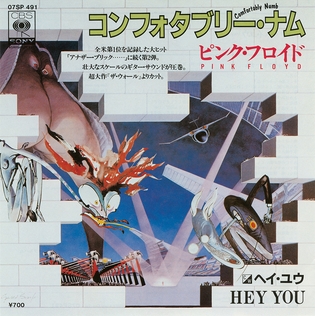
"Comfortably Numb" is a song by the English rock band Pink Floyd, released on their eleventh studio album, The Wall (1979). It was released as a single in 1980, with "Hey You" as the B-side.

"Money" is a song by English rock band Pink Floyd from their 1973 album The Dark Side of the Moon. Written by Roger Waters, it opened side two of the original album. Released as a single, it became the band's first hit in the United States, reaching number 10 in Cash Box magazine and number 13 on the Billboard Hot 100.

"Woodstock" is a song written by Canadian-American singer-songwriter Joni Mitchell. At least four notable versions of the song were released in the same year, 1970. Mitchell's own version was first performed live in 1969 and appeared in April 1970 on her album Ladies of the Canyon and as the B-side to her single "Big Yellow Taxi". This publication was preceded by Crosby, Stills, Nash & Young's cover version, which appeared on their March 1970 album Déjà Vu and became a staple of classic rock radio and the best-known version in the United States. A third version, by the British band Matthews Southern Comfort became the best known version in the United Kingdom, and was the highest charting version of the song, reaching the top of the UK singles chart in 1970. A fourth version by studio project The Assembled Multitude also became a chart hit.
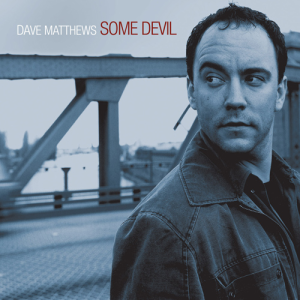
Some Devil is the only solo studio album by musician Dave Matthews. It was released on September 23, 2003 on RCA Records. It has been certified platinum by the RIAA, signifying over a million copies sold. The album features several guest musicians, including long-time Dave Matthews Band collaborator guitarist Tim Reynolds and Phish frontman and guitarist Trey Anastasio. The album's first single, "Gravedigger," won a Grammy Award in 2004. Some Devil was recorded at Studio Litho in Seattle, Washington, and produced by Stephen Harris, who had previously worked with the Dave Matthews Band on their 2002 album Busted Stuff.
Song structure is the arrangement of a song, and is a part of the songwriting process. It is typically sectional, which uses repeating forms in songs. Common forms include bar form, 32-bar form, verse–chorus form, ternary form, strophic form, and the 12-bar blues. Popular music songs traditionally use the same music for each verse or stanza of lyrics. Pop and traditional forms can be used even with songs that have structural differences in melodies. The most common format in modern popular music is introduction (intro), verse, pre-chorus, chorus, verse, pre-chorus, chorus, bridge, and chorus. In rock music styles, notably heavy metal music, there is usually one or more guitar solos in the song, often found after the middle chorus part. In pop music, there may be a guitar solo, or a solo performed with another instrument such as a synthesizer or a saxophone.

"Alive" is the debut single by American rock band Pearl Jam. It was released on July 7, 1991, 51 days before the release of the band's debut album, Ten, on which "Alive" appears. Written by guitarist Stone Gossard, the song originated as an instrumental titled "Dollar Short" and was included on a demo tape circulated in hopes of finding a singer for the group. Vocalist Eddie Vedder obtained a copy of the tape and wrote lyrics that describe a somewhat fictionalized account of the time when he was told that the man he thought was his father was not actually his biological parent.

"Down by the River" is a song composed by Neil Young. It was first released on his 1969 album with Crazy Horse, Everybody Knows This Is Nowhere. Young explained the context of the story in the liner notes of his 1977 anthology album Decade, stating that he wrote "Down by the River," "Cinnamon Girl" and "Cowgirl in the Sand" while delirious in bed in Topanga Canyon with a 103 °F (39 °C) fever.
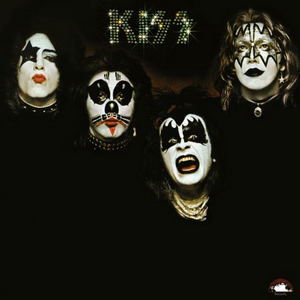
Kiss is the debut studio album by American rock band Kiss, released on February 18, 1974. Much of the material on the album was written by Gene Simmons and Paul Stanley, as members of their pre-Kiss band Wicked Lester. Simmons estimated that the entire process of recording and mixing took three weeks, while co-producer Richie Wise has stated it took just 13 days.
"Grantchester Meadows" is the second track from the studio disc of the Pink Floyd album Ummagumma.

"Run Like Hell" is a song by English rock band Pink Floyd, written by David Gilmour and Roger Waters. It appears on the album The Wall. It was released as a single in 1980, reaching #15 in the Canadian singles chart and #18 in Sweden, but it only reached #53 in the U.S. A 12" single of "Run Like Hell," "Don't Leave Me Now" and "Another Brick in the Wall " peaked at #57 on the Disco Top 100 chart in the U.S. To date, it is the last original composition written by both Gilmour and Waters, the last of such under the Pink Floyd banner, and is the last composition ever recorded by all four members of the classic 70s-era Floyd lineup together, within their traditional instrumental roles of Waters on bass, Gilmour on guitars, Nick Mason on drums, and Richard Wright on keyboards, on the same song.
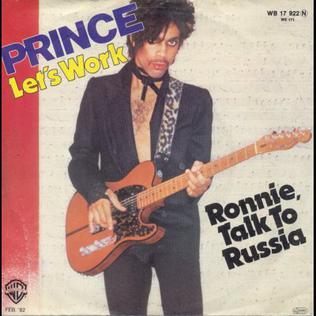
"Let's Work" is a song by Prince, released as the second single from his 1981 album Controversy. The song originates from a dance called "the Rock" that local kids were doing at the time in Minneapolis. Prince responded quickly with a track called "Let's Rock", and wished to quickly release it as a single. Warner Bros. refused, and a disappointed Prince did not include the song on Controversy, saying the phase had passed. Instead, the song was updated with new lyrics and possibly new music and became "Let's Work"—one of his most popular dance numbers.

"Us and Them" is a song by English rock band Pink Floyd, from their 1973 album The Dark Side of the Moon. The music was written by Richard Wright and Roger Waters with lyrics also by Waters. It is sung by David Gilmour, with harmonies by Wright. The song is 7 minutes and 49 seconds, the longest on the album.
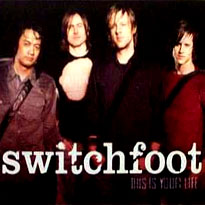
"This Is Your Life" is a song by the alternative rock band Switchfoot, and their third single. "This Is Your Life" first appeared on the group's 2003 album The Beautiful Letdown and peaked at #30 on the US Modern Rock charts. The single also hit the U.S. top 40, peaking at No. 31.
"Good Old-Fashioned Lover Boy" is the eighth track from the British rock band Queen's 1976 album A Day at the Races, written by Freddie Mercury. It was also released as a single in 1977 on 7-inch vinyl. It was one of several British music hall-inspired songs composed by members of the band. It reached number 17 on the UK Singles Chart.
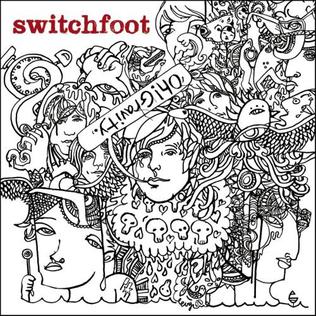
Oh! Gravity. is the sixth album by the San Diego based alternative rock band Switchfoot. It was released on December 26, 2006. It was Switchfoot's last album released through Columbia Records and Sony BMG.

The Appetite for Construction Tour was a three-month 2007 concert tour that was co-headlined by rock bands Switchfoot and Relient K, with special guests Ruth.
"Racing in the Street" is a song by Bruce Springsteen from his 1978 album Darkness on the Edge of Town. In the original vinyl format, it was the last song of side one of the album. The song has been called Springsteen's best song by several commentators, including the authors of The New Rolling Stone Album Guide.

"FM (No Static at All)" is a song by American jazz-rock band Steely Dan, the title theme for the 1978 film FM. It made the US Top 40 that year when released as a single, a success relative to the film. Musically, it is a complex jazz-rock composition driven by its bass, guitar and piano parts, typical of the band's sound from this period; its lyrics look askance at the album-oriented rock format of many FM radio stations at that time, in contrast to the film's celebration of that medium.
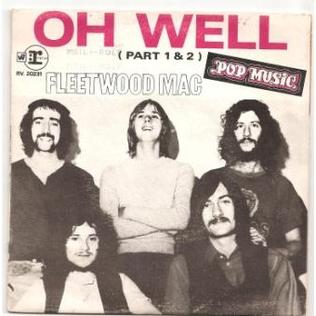
"Oh Well" is a song first recorded by the rock band Fleetwood Mac in 1969, composed by vocalist and lead guitarist Peter Green. It first appeared as a Fleetwood Mac single in various countries in 1969 and subsequently appeared on US versions of that year's Then Play On album and the band's Greatest Hits album in 1971. The song was later featured on the 1992 boxed set 25 Years – The Chain, on the 2002 compilation album The Best of Peter Green's Fleetwood Mac, and on the 2018 compilation 50 Years – Don't Stop.
















